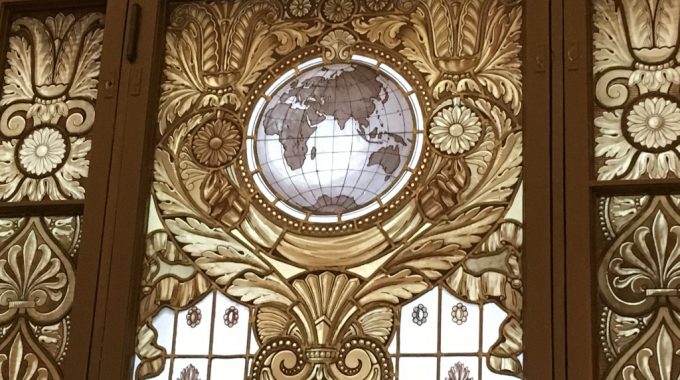
Nations becoming something more: European perspective
We often hear Christian arguments being mingled with nationalistic rhetorics in current political debates. In the following article, Ineta Lansdovne, as a Latvian who grew up in the Soviet Union, expresses her personal views on the question.
From peaceroads.com
Sitting in Lähetyskirkko in Helsinki, an old church with a very contemporary and welcoming feel, I was drawn to the stained-glass window with the map of the world. Enframed within the ornate design, it looked beautiful but small and somehow fragile. Just like those amazing images from the outer space which make me think about “the whole world in His hands”.
The world and the continents may seem monolithic but not so once we zoom in and the borders of the nations come into our focus. As I was looking at Europe, my mind was playing one of those interactive maps which show how the borders of the European nations have shifted through the millennia, centuries, decades and years. With so much… too much blood spilled fighting over these lands and the borders. And Latvia, this small corner on the Baltic Sea, has suffered under many powerful and shifting winds of history.
Here I was in Helsinki, participating in a State of Europe Forum (SOEF) which focused on the current European challenges and also opportunities for creative solutions. Christian leaders from many different backgrounds – arts, church, government, politics, science, academia, business, education, environmental work, etc. – came together with an agenda to explore difficult and important issues. The SOEF framed these topics within the premise of “the largely Christian origins of the European movement, and of ongoing Christian responsibility towards the shaping of Europe’s future”. The underlying question – “why do such roots matter for the future?”
One of the sessions focused on the current trends of rising nationalism and populism in democratic nations. What concerns me the most, though, is when religion, specifically, Christianity gets weaponized to legitimize obviously authoritarian, undemocratic and simply unjust ideas and actions. For example, the “infamous” Crimean speech in 2014 which the president of Russia, Vladimir Putin, gave on the occasion of annexation and “unification” of Crimea with Russia. “Everything in Crimea speaks of our shared history and pride. This is the location of ancient Khersones, where Prince Vladimir was baptised. His spiritual feat of adopting Orthodoxy predetermined the overall basis of the culture, civilisation and human values that unite the peoples of Russia, Ukraine and Belarus.”
Russia is an obvious and easy target to highlight these trends but unfortunately it is not the only example. It comes much closer. I could name various similar ideas in the West – in Brexit debates, elections in the U.S.A., memory and identity politics, migration policies and foreign policies in other Western countries. Therefore in any public discussion that focuses on Christianity’s influence in the history of European nations, we, Christians, have to take a very hard and long look into the mirror and examine our own reflection. Why do we allow for our faith to be weaponized in such ugly ways?
Recently I heard some statements which I really liked. These were stated during Riga Conference 2019 panel discussion on ” New powers – shaping regions or shaping history?” by Simon Serfaty, a professor of political science at Old Dominion University in Norfolk, Virginia, USA. He was discussing the weaknesses in authoritarian systems and how the “new” and “renewed” influential nations, for example, China, Russia and Turkey “live their future in the past tense” with revisionist approach. S. Serfaty described the project of European Union as “a matter of necessity, not a matter of choice” and asked the audience “how, when and whether this necessity is gone?”
S. Serfaty concluded: “The liberal hegemonic order did not force its participants to become somebody or something else; it forced its participants to become somebody or something more.” This statement immediately reminded of my personal experience growing up in the Soviet Union and now living in the European Union. I thought to myself: “Exactly! Soviet Union tried to shape us into something else against our own will but European Union gives so many nations a chance to try to become something more.”
More than just nations focused on their own nationalistic interests with attitude ” God bless us (and no place else)!” In the current global situation would be extremely difficult to defend the so-called fundamental EU values – respect for human dignity and human rights, freedom, democracy, rule of law, equality and peace – outside such a unprecedented platform of “Unity in Diversity”.
Ineta Lansdovne

This Post Has 0 Comments